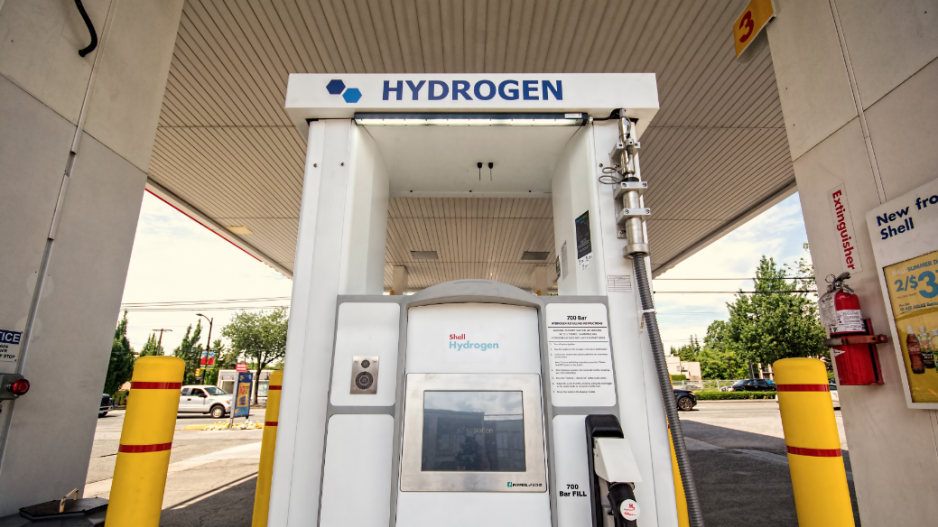Pop the hood of the Mercedes-Benz GLC F-Cell, the world’s first electric vehicle that also runs on hydrogen fuel, and one finds a distinct piece of hardware that can be traced back to B.C.
“That [heart of the] fuel-cell engine was developed at AFCC,” said Joachim Blum, referring to Burnaby-based Automotive Fuel Cell Cooperation, where he’s serving his last few days as its CEO.
And after years of development, AFCC will see the mid-size sports utility vehicle go into production later this year.
It’s a milestone for the organization, which launched in 2008 as a joint venture between Burnaby’s Ballard Power Systems Inc. (TSX:BLDP), Ford Motor Co. (NYSE:F) and Daimler AG.
But it also marks the venture’s demise.
At the end of June, AFCC is slated to cease operations while Ford and Daimler move their fuel-cell development in-house to Michigan and Germany, respectively.
While AFCC’s closure and the loss of 200 jobs are a blow to the sector in the short term, experts say it will be a boon for smaller, nimbler fuel-cell ventures in need of talent as the industry shifts toward commercialization.
“These types of companies closing down aren’t a bad thing,” said Mike Sexsmith, founder and general manager of Burnaby’s OverDrive Fuel Cell Engineering Inc. “It’s healthy for that [fuel-cell] ecosystem. We’re going to see the seeds of AFCC’s DNA spread around.”
Sexsmith was AFCC’s director of research before launching a new firm last September that helps businesses navigate the fuel-cell industry and improve product and service deployment.
OverDrive has since recruited more than 25 fuel-cell experts, most of whom came from AFCC.
Sexsmith said the decision to shutter the joint venture marks a significant transition point for the fuel-cell industry.
“By shutting down AFCC and pulling these things in-house they’re saying, ‘Yeah, it’s time now to move this into the commercial world, and this is no longer a research activity for us; this now needs to be part of our mainstream business.’”
One obvious sign of commercialization was the June 15 opening of Canada’s first retail hydrogen refuelling station for hydrogen-fuel-cell electric vehicles.
A Shell Canada Ltd. location at Granville Street and 71st Avenue is the only station in the country open to the public and is among three sites that Shell and the Hydrogen Technology and Energy Corp. plan to launch in the city.
“One of the impediments for the really broad commercialization of fuel cells is the availability of infrastructure,” said Jim Boerger, a Ford manager on assignment to AFCC as its director of operations. “This is the beginning of getting this infrastructure in place so they’ll really be required to support broader industrialization.”
Former AFCC CEO Andreas Truckenbrodt, who now heads the Canadian Hydrogen and Fuel Cell Association, said his organization is sorry to see Daimler and Ford leave Vancouver, but he added that the experts coming out of the joint venture will serve as the foundation for new companies being established in B.C.
“The hydrogen and fuel-cell industry has seen many ups and downs,” he said in an email to Business in Vancouver. “In the last years, we see more and more commercial hydrogen and fuel-cell products enter the markets, and Canadian companies are among the worldwide leaders in this technology. We believe that this is a consistent and lasting development and quite ‘healthy.’”
Ballard, OverDrive, Ford and Daimler have all made job offers to some of the experts departing AFCC.
Engineer and Electron Communications consultant Matthew Klippenstein, who previously worked for both Ballard and AFCC, said he also expects Chinese-backed startups to be quick to recruit fuel-cell talent in B.C.
Meanwhile, research and development continues in the city. Austria-based engineering firm AVL announced in April it would launch a fuel-cell R&D centre in Vancouver this year.
Sexsmith said AVL has been quietly investing in fuel cells for years, albeit at a slow pace.
“And now they’re saying, ‘It’s time to grow. Where are you going to get people? Let’s go to Vancouver.’ Generally speaking, Europe tends to want to protect its own European economy and therefore likes to do things inside the eurozone … and the fact that they’re coming to Vancouver means the incentive is really high.”
Blum told BIV AFCC’s closure comes down to a strategic business decision. The company had reached a number of “technical maturity goals” – the Mercedes fuel-cell engine going into production being one of the most notable – and it was a natural time to conclude the joint venture, he said.
But Blum emphasized that Ford and Daimler both intend to continue developing the technology.
While the two automotive giants retain the rights to the intellectual property created in B.C., some of that IP will remain across the street from AFCC’s old offices where Daimler subsidiary Mercedes owns a production company.
“In the wake of AFCC closing, we are starting a … small but new development team under the head of [Mercedes-Benz] Canada,” Blum said. “They will also have access to the IP that Ford and Daimler have.”




